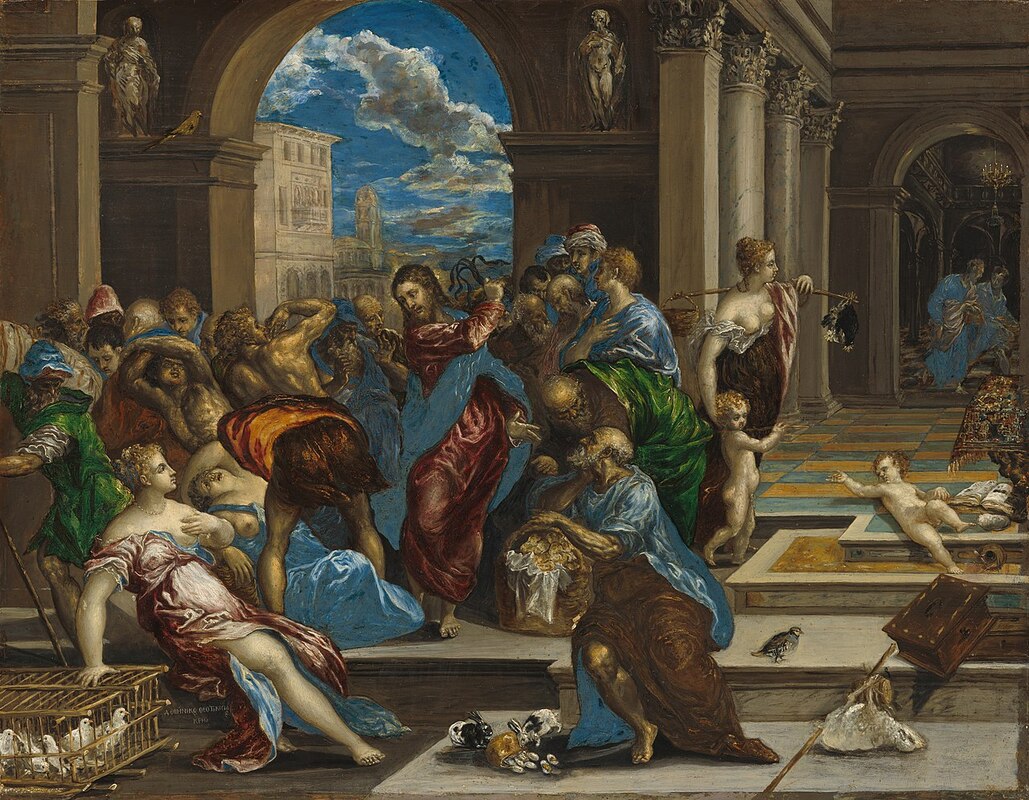 El Greco, Public domain, via Wikimedia Commons by the Reverend Nancy Emmel-Gunn Our Gospel today teaches us that Jesus is the new temple, the very embodiment of God. We are invited this week to continue our Lenten journey in the wilderness, to look at ourselves as community, and to explore how to be Christ’s hands and feet today. John offers us the cleansing of the Temple narrative. We find this story of Jesus throwing tables around, casting out animals in the Jerusalem Temple, in all four Gospels. John’s version weaves in he Passover theme within the larger context of Jesus’ ministry. We can envision the sprawling, noisy, chaotic market place in the Temple, in and around the Temple courtyard and in the sanctuary. We can visualize the moneychangers, sitting at tables, abacus in hand exchanging coins with customers, merchants haggling over cattle, sheep and doves in exchange for the agreed price. We can hear the sheep bleating. We can smell the odor of wet wool. Jesus is outraged at this scene. He turns over their tables. He makes a whip of cords and chases the animals outside of the temple, shouting to the dove salespeople, “Take these things out of here. Stop making my father’s house a marketplace!” To be clear, the moneychangers and merchants in the temple were not merely abusing the temple. This was the Passover feast, and the people had come to the Temple in Jerusalem from all over the land, throughout the Jewish diaspora. Scholars believe that the population of Jerusalem would more than triple during the Passover in the first century. The purchase of cattle and sheep or doves for those of modest means, were necessary for burnt offerings in the Temple. If people wished to participate in temple worship, and had traveled some distance, they may not have been able to bring their animals for sacrifice. They certainly could not have kept their animals sufficiently pristine for sacrifice, hence the need to purchase them when they arrived. Moneychangers were necessary because foreign currency had to be changed into the currency for use in the Temple. There were no handy ATMs to do the foreign currency exchange. So the presence of this marketplace had some legitimate purpose to the worshipping Jewish community. But Jesus is outraged and he shows it. The Jews ask Jesus, “What sign do you show us, seeing that you do these things?” Jesus does not respond as they might have expected. He says “Destroy this temple, and in three days I will raise it up.” Of course the Jews and Jewish leaders in the Temple have no idea what he is talking about. The Temple in Jerusalem had been under construction for decades. These people would no more destroy what they believed to be the very home of God, than they would fail to follow their belief in God’s command to offer sacrifice. This reference went entirely over their heads. It is also unlikely that Jesus’ disciples appreciated these words when Jesus spoke them. The gospel writer cues us in, “But he spoke of the temple of his body.” John goes on to explain: “After he was raised from the dead, his disciples remembered that he had said this.” It is only after Christ died and was resurrected that even the disciples understood what he was referring to in this temple cleansing. This passage then reveals the absolute revolution that is Jesus. Jesus makes the prophetic statement that he will be destroyed and will rise up in three days. Jesus proclaims that the very locus of the people’s faith, the source of the people and their relationship with God, has changed. The focus shall no longer be the Jerusalem Temple as "holy place." Now, Jesus’ body is the locus. Jesus, the embodiment of God is the temple, the manifestation of God’s presence on earth. This is an entirely new construction, the good news for all people. In this pandemic time, when we have not been able to worship in our holy spaces, we might ask about our place of worship. Where is our temple when we cannot worship there? This scripture answers us. Regardless of where or how we worship, in person or on Zoom, our temple is with Jesus. And what is our relationship to Jesus as temple? Paul tells us elsewhere in his first letter to the Corinthians, "Now you are the body of Christ." We are called to be as Christ’s hands and feet, body and mind, called to do the work of spreading the love of Christ. If we are the body of Christ, how might we be further called? In the words of our baptismal covenant, what can we do to serve Christ in all persons, loving our neighbor as ourselves? We might consider the ways in which this pandemic has harmed others. Well for one, look at how children all over the world have been harmed. I saw a visual image produced online this week, showing thousands of empty small desks and children’s backpacks. These represented the millions of children throughout the world who have been unable to attend school for a year. It is not difficult to imagine that here in Tower Grove South, children have lost terribly, their education disrupted. When I was teaching Sunday School at Trinity Church a few years ago, a young African-American boy bounded into my classroom. Jacob (not his real name) was about ten, bright eyed and with a huge grin on his face. He joyfully announced, “I love God.” I responded, “I do too.” He accompanied his two younger siblings that morning and comforted his little sister, encouraged his little brother. This child was remarkable in his love of God, his joy, his kindness. That first day, I invited Jacob to read aloud in our simple, children’s bible primer, and he faltered. Although he was old enough to have basic reading skills, he was far from grade level. Eventually, a Trinity volunteer worked with him and I am told he made some progress. But I worry about Jacob in this pandemic. During this pandemic, I wonder if Jacob had to care for his brother and sister. School in person some time, school on line some time. Keeping an eye on the younger children. What would be the result of a fractured school year on top of the fact that he was already behind his grade level in reading? I will bet you that there are other children like Jacob, living right here. And with a year of inconsistent instruction, where will these students be in terms of competitive academic achievement? We have not even begun to contemplate how this pandemic has impacted us for the long term, and in particular, poor persons of color. Families like Jacob’s. Perhaps in our wilderness time, during these forty days, we can open our minds and hearts to the pain of our neighbors and the possibility of even greater service to our community. In the face of this pandemic, what might we offer our neighbor children like Jacob? Or we might ask, how have our undocumented neighbors who have lived in fear of being expelled from this country fared? What about black and brown families who have been disproportionately affected by Covid? These are just a few examples of folks in need, living right around us, adversely impacted by the pandemic. Our wilderness time in Lent calls us to look at ourselves individually and as community. We consider not only who we are but, more importantly, who we can become, what more might be possible? We can continue to refine our temple, wherever it may be, to be a home of deep spiritual communion with Christ and creative, abundant service. We are invited to explore these possibilities as we continue our wilderness journey. Amen. The Reverend Nancy Emmel-Gunn is a transitional deacon in the Diocese of Missouri, currently serving at St. John's.
0 Comments
Leave a Reply. |
Editorial contactVarious members of the St. John's congregation contribute to this blog. For editorial suggestions, contact Jeff McIntire-Strasburg at [email protected] Archives
May 2024
CategoriesAll Bishop Deon Johnson Book Group Congregation Members Deacons Diocese Of Missouri Episcopal Church Features General Information Parish Events Podcast Presiding-bishop-michael-curry Sermons Terms-of-transition Vestry |

 RSS Feed
RSS Feed

